PEP小学英语毕业总复习----时态详解打印
小学PEP英语总复习3-6年级英语语法总结(最全)
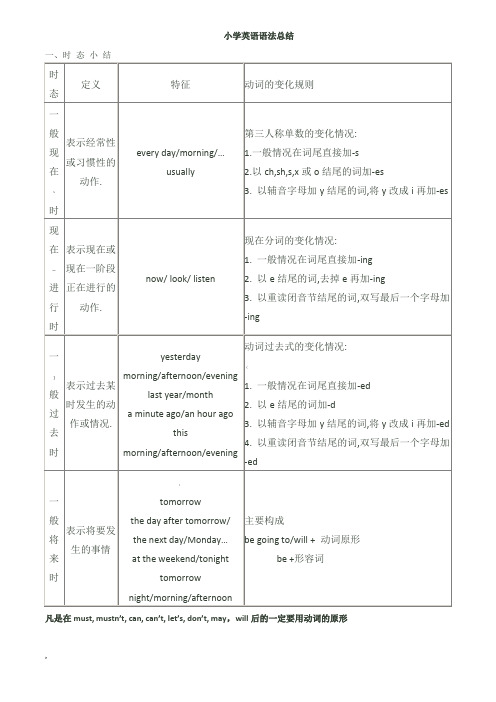
小学英语语法总结一、时态小结凡是在must, mustn’t, can, can’t, let’s, don’t, may,will后的一定要用动词的原形>二、名词的复数。
名词按其数,可分两种:可数名词和不可数名词.可数名词的复数变化规则:1. 一般情况下,直接在词尾加-s, 如:girl-girls, book-books, pen-pens2. 以s,x,sh,ch结尾的词,在词后加-es, 如:class-classes, box-boxes, match-matches,3. 以辅音字母+y结尾的,变y 为i 再加-es, 如:city-cities, family-families, country- countries4. 以f或fe结尾的,变f或fe为v再加-es, 如:knife-knives, wife-wives, life-lives,5. 以o 结尾的加-es或-s, 如: radio-radios, tomato-tomatoes, potato-potatoes, zoo-zoos, photo-photos,6. man-men, woman-women, foot-feet, child-children,三、形容词的比较级、最高级。
{形容词有比较级与最高级之分, 单音节词的变化规则:1. 一般情况下,直接在词尾加-er或-est, 如:small-smaller-smallest, short-shorter-shortest2. 以e结尾的,加-er或-est, 如:large-larger-largest, nice-nicer-nicest.3.以辅音字母+y结尾的, 变y 为i 再加-er或-est, 如:busy-busier-busiest, heavy-heavier-heaviest.4. 以重读闭音节,一个辅音字母结尾的,双写该字母,再加-er或-est, 如:big-bigger-biggest, thin-thinner-thinnest.5.多音节的词,前加more, most, 如: beautiful-more beautiful-most beautiful.6. good-better-best四、be 动词,助动词。
pep小学英语四个时态及其练习打印

小学英语四种时态及练习一、一般现在时1. 意义:表示习惯或者爱好。
如:I get up at six every day. I like draw ing pictures. 2. 结构:I am a boy.我是一个男孩。
We study En glish.我们学习英语。
注意:当主语为第三人称单数(he, she,it,Mike) "-es"。
女口: Mary likes Chinese. 玛丽喜欢汉语。
3. 时间标志:usually ,ofen, sometimes, always, everyday, on Sun days4. 动词+s 的变化规则1) 一般情况下,直接加-s ,如:cook-cooks, milk-milks2) 以 s. x. sh. ch. o 结尾,力卩-es ,女口: wash-washes, watch-watches, go-goes 3) 以“辅音字母+y ”结尾,变y 为i,再加-es ,如:study-studies练习一般现在时用法专练: 一、写出下列动词的第三人称单数二、用括号内动词的适当形式填空。
1. He ofte n _has _____ (have) dinner at home.2. Dan iel and Tommy _are ____ (be) in Class One.3. We _dont_watch ___ (not watch) TV on Mon day.4. Nick _doesn't _ go __ (not go) to the zoo on Sun day.5. __Do __ they _____ like ___ (like) the World Cup?6. What __do ___ they often ___ do ___ (do) on Saturdays?7. __ Do ____your pare nts __read ____ (read) n ewspapers every day?8. The girl _____ (teaches) us En glish on Sun days.9. She and I ____ take ___ (take) a walk together every eve ning. 10. There ___is ___ (be) some water in the bottle. 11. Mike _______ (likes) cook in g.12. They _______ (have) the same hobby.13. My aunt ______ (looks) after her baby carefully. 14. You always _______ (do) your homework well. 15. I __ a ____ (be) ill. I ' m staying in bed. 16. She ___ goes __ (go) to school from Mon day to Friday.我每天六点起床。
PEP小学英语毕业总复习----时态详解打印

第一讲一般现在时一、一般现在时的功能:1、表示事物或人物的特征、状态。
如:The sky is blue.天空是蓝色的。
2、表示经常性或习惯性的动作。
如:I get up at six every day.我每天六点起床。
3、表示客观现实。
如:The earth goes around the sun.地球绕着太阳转。
二、一般现在时的基本构成:1、含be动词的:主语+be(am,is,are)+其它。
如:I am a boy.我是一个男孩。
2、只含行为动词的:主语+行为动词(+其它)。
如:We study English.我们学习英语。
当主语为第三人称单数(he, she,it)时,要在动词后加"-s"或"-es"。
如:Mary likes Chinese. (玛丽喜欢汉语。
)三、一般现在时的变化:1、含有be动词的句子1)否定句:在be动词后加not 如:He is not a teacher.(他不是教师。
)2)一般疑问句:把be动词调到句首。
如:Is she a teacher?3)特殊疑问句:疑问词+一般疑问句。
如:Where is my bike?2、不含be动词,只含行为动词的句子1)否定句:don’t(或doesn’t) +动词原形。
如:I don’t like banana. He doesn’t like apple. 2) 一般疑问句:Do( Does ) +主语+动词原形(+其它)。
如:- Do you often play football? sh.Does your mother teach English?3)特殊疑问句:疑问词+一般疑问句。
如:How does your father go to work?★动词单三形式的变化规则:(当主语为第三人称单数时)1.一般情况下,直接加-s,如:like-likes ,work-works2.以s. x. sh. ch. o结尾,加-es,如:watch-watches,wash-washes,go-goes3.以“辅音字母+y”结尾,变y为i, 再加-es,如:study-studies★一般现在时的标志:(表示经常性的时间状语)usually(通常),sometimes(有时),often(经常)等第二讲现在进行时一、现在进行时的功能:表示现在正在进行或发生的动作。
PEP版小学英语四种时态复习
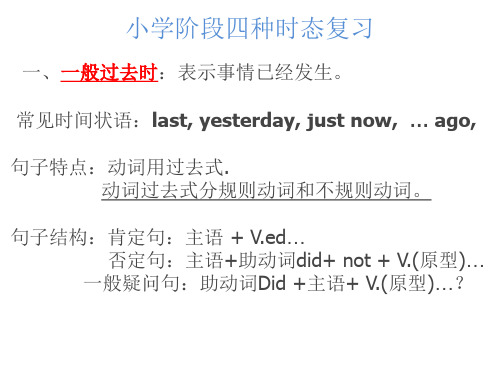
be动词用过去式:am,is—was; are—were 句子结构: 肯定句:主语 + was/were… 否定句:主语 + was/were +not +… 一般疑问句:was/were+主语+…?
Eg 1. I was a student some years ago. I wasn’t a student some years ago. 否定:__________________________ Was I a student some years ago? 一般疑问句:________________________
小学阶段四种时态复习
一、一般过去时:表示事情已经发生。
常见时间状语:last, yesterday, just now, … ago,
句子特点:动词用过去式. 动词过去式分规则动词和不规则动词。 句子结构:肯定句:主语 + V.ed… 否定句:主语+助动词did+ not + V.(原型)… 一般疑问句:助动词Did +主语+ V.(原型)…?
eg:1. I am going to play football this afternoon. I am not going to play football this afternoon. 否定:__________________________
Am I going to play football this afternoon? 一般疑问句:______________________
2. They all went to the mountains yesterday morning. all didn’t go to the mountains yesterday morning. 否定:They __________________________
PEP小学英语毕业时态总复习
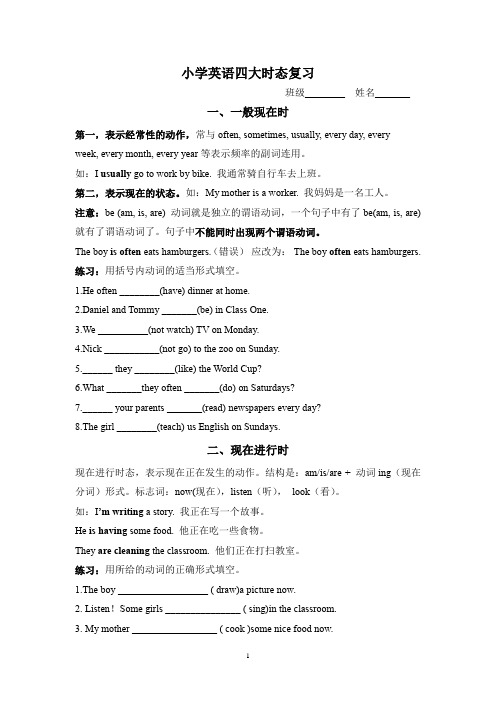
小学英语四大时态复习班级________ 姓名_______一、一般现在时第一,表示经常性的动作,常与often, sometimes, usually, every day, every week, every month, every year等表示频率的副词连用。
如:I usually go to work by bike. 我通常骑自行车去上班。
第二,表示现在的状态。
如:My mother is a worker. 我妈妈是一名工人。
注意:be (am, is, are) 动词就是独立的谓语动词,一个句子中有了be(am, is, are) 就有了谓语动词了。
句子中不能同时出现两个谓语动词。
The boy is often eats hamburgers.(错误)应改为:The boy often eats hamburgers. 练习:用括号内动词的适当形式填空。
1.He often ________(have) dinner at home.2.Daniel and Tommy _______(be) in Class One.3.We __________(not watch) TV on Monday.4.Nick ___________(not go) to the zoo on Sunday.5.______ they ________(like) the World Cup?6.What _______they often _______(do) on Saturdays?7.______ your parents _______(read) newspapers every day?8.The girl ________(teach) us English on Sundays.二、现在进行时现在进行时态,表示现在正在发生的动作。
结构是:am/is/are + 动词ing(现在分词)形式。
小学英语毕业总复习四种时态语法解析

小学英语毕业总复习四种时态语法解析第一篇:小学英语毕业总复习四种时态语法解析小学英语毕业总复习四种时态语法解析现在进行时一.意义——当表示现在正在进行的动作或正在发生的事。
二.构成: be(am, is ,are)+动词现在分词-ing形式肯定句:主语 + be + 现在分词V-ing(+ 其他)I’m doing my homework now.否定句:主语+be+not+动词-ing +其他.I’m not doing my homework now.一般疑问句:Be+主语+动词-ing +其他?Are you doing your home work now? Yes, I am.No , I’m not.特殊疑问句:特殊疑问词+be+主语+动词-ing+其他?What are you doing now ? 三.现在分词的构成:(1)一般在动词末尾直接加ing,(2)以不发音字母e结尾的动词,先去掉e,再加ing,如skate →skating make →making dance → dancing write → writing have → having ride → riding come → coming(3)以重读闭音节结尾的动词,中间只有一个元音字母,词尾只有一个辅音字母,应双写末尾的辅音字母,再加ing,如: putting running beginning stopping swimming shoppingjoggingsittinggetting forgetting letting 四.时间标志——now,句前的look ,listen一般现在时一.意义:表示经常发生的事情,动作或存在的状态二.构成及变化 1.be动词的变化。
肯定句:主语+be(am,is,are)+其它。
如: I am a boy.我是一个男孩。
否定句:主语+ be + not +其它。
如:He is not a worker.他不是工人。
PEP小学英语四种时态
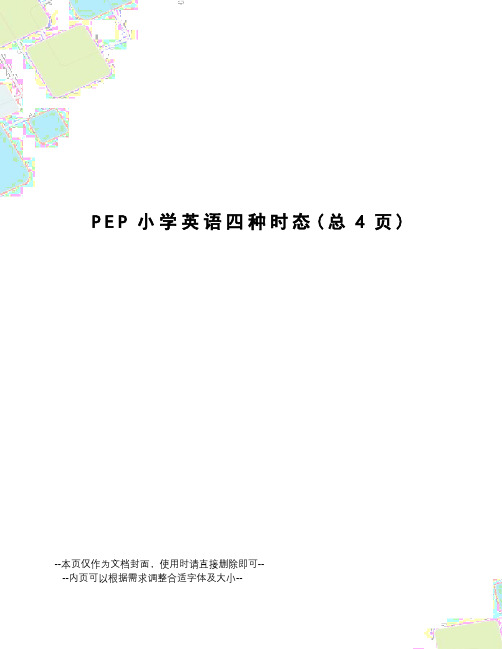
P E P小学英语四种时态(总4页)--本页仅作为文档封面,使用时请直接删除即可----内页可以根据需求调整合适字体及大小--pep小学英语四大基本时态一、一般现在时1.一般现在时表示一般情况下经常发生的动作或存在的状态。
常与 usually, sometimes, often, always等词连用。
2.一般现在时的谓语动词为be动词时,be的变化遵循“我用am, 你用are, is用在他她它,复数全用are”的规律。
3.一般现在时的谓语动词为其它动词时,当主语为第三人称单数时,动词要用第三人称单数形式。
如:Mary likes Chinese.玛丽喜欢汉语。
4.动词第三人称单数的变化规则:(1)一般的动词,直接在词尾加s,如:cook-cooks, like-likes.(2)以s,x,sh,ch,o等结尾的动词,加es,如:wash-washes, watch-watches, go-goes, do-does.(3)以辅音字母加y结尾的动词,变y为i, 再加es,如:study-studies.(4)不规则变化,如:have-has.否定句:主语+ be + not +其它。
如:He is not a worker.他不是一名工人。
一般疑问句:Be +主语+其它如:Are you a student(2)行为动词的变化。
否定句:主语+ don't( doesn't ) +动词原形(+其它)。
如:I don't like bread. 当主语为第三人称单数时,要用doesn't构成否定句。
如:He doesn't like PE.一般疑问句:Do( Does ) +主语+动词原形+其它如:Do you often play chess当主语为第三人称单数时,要用does构成一般疑问句。
如:Does she like PE? 特殊疑问句:疑问词+一般疑问句如:How does your father go to work现在进行时1.现在进行时表示现在正在进行或发生的动作。
PEP六年级英语下册小学时态总复习 (2)

(+其它). I am not watching TV now.
一般疑问句:Be(Am,Is,Are)+主语+动词-ing (+其它)? Are you watching TV now?
根据图画利用所学的现在进行时造句。
3.一般现在时的构成(基本结构)
一般现在时分为 be 动词的一般现在时
和实义动词的一般现在时。 ①be动词: 陈述句/肯定句:主语+be(am,is,are)+其它.
I am a student. 否定句:主语+ be(am,is,are)+not +其它.
I am not a student. 一般疑问句:Be(Am,Is,Are) +主语+其它?
生的动作,强调“此时此刻”。
2、标志词: now现在
look!看
listen!听
They are playing football now.
Listen! She is singing a song.
3.现在进行时的构成(基本结构)
be(am,is,are)+动词-ing 肯定句:主语 + be + 动词-ing (+其它).
they go shopping every Sunday
They go shopping every Sunday. They don't go shopping every Sunday. Do they go shopping every Sunday?
小学英语时态总复习(课件)度人教版PEP版英语六年级下册
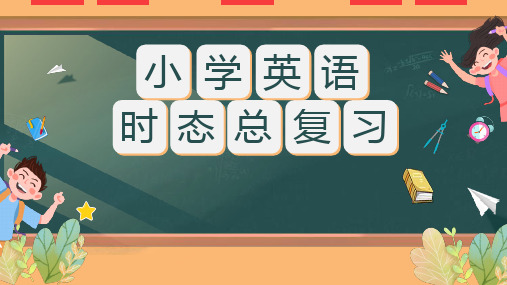
When did you clean the classroom?
yesterday
给对应的时态找到时间伙伴
用动词的正确形式填空 1. she __d_o_e_s_ (do) her homework every evening. 2. We ___f_l_y__ (fly) kites in the park on Sundays. 3. My mother __c_le_a_n_e_d_ (clean) our room last Sunday. 4. Tom __p__la_y_s_(play) the piano every Saturday. Now he_i_s_p_la_y_ing(play). 5. She __l_ik_e_s__(like) swimming. She i_s g_o_in_g_to__sw_im_(swim) next weekend. 6. Usually my mother _w_a_s_h_e_s_ (wash) the dishes after lunch. But my grandma_w_a_s_h_e_d_ (wash) yesterday. 7. Look at the man! He __is_r_e_a_d_i_n_g__ (read) a magazine. 8. _D__id_ (do)you__d_o(do)homework last weekend?
习惯性的 动作
爱好
Tip
经常发生
现在进行时态 表示正在发生的动作, 常与表示现在的时间 now, listen, look 连用
结构:
问:What+be动词+主语+doing? 答:主语+be动词+动词ing形式。 如:——What are you doing?
人教版(PEP)小升初总复习—时态课件

6. They are going to_h_a_v_e__( have) an atr lesson. 7. He will c_l_e_a_n(clean) the classrom after school.
如:—Are you a student? —Yes. I am. / No, I'm not.
特殊疑问句:疑问词 + 一般疑问句? 如:What is his job?
2、含有实义动词
肯定句: 主语+ 动词+(其他). 否定句:主语 + don’t / doesn’t + 动原+( 其它)。
如:He doesn't often play. 一般疑问句:Do / Does + 主语 + 动原 +(其它)。
7. He _r_e_a_d__(read) a book last night.
练习
1. It _w_a_s_ (be) Mike’s birthday last Friday. 2. We all __h_ad_ (have) a good time last night. 3. She _r_e_a_d_a book yesterday. (read) 4. Jim didn’tg_o___(go) home yesterday. 5. I didn’t _f_e_e_l ( feel ) very well yesterday .
练习
1. He _is__w_a_t_e_ri_n_g(water) the trees now. 2. Look!she i_s_s_i_n_g_in_g(sing) in the classroom. 3. What __ar_e_ you d_o_i_n_g__(do) now? 4. The boy i_s_d_r_a_w_i_n(gdraw) a picture now. 5. My mother i_s_c_o_o_k_i_ng_( cook ) some fish now.
小毕考英语总复习第四部分 时态精析 第五节一般过去时 人教pep

A. Was
B. Did
C. Does
( C )4. Mike: _____ you in Shanghai last week? Tony: Yes, I _____.
A. Was; was
B. Did; did
C. Were; was
( B )5. I _____ swimming _____ Mike last month.
2. 否定句: (1) 主语+was/were+not+其他。 如: Tom wasn't at home yesterday. 昨天汤姆不在家。 (2) 主语+didn't+动词原形+其他。 如: Ben didn't come to school yesterday. 昨天本没有来上学。 We didn't go shopping last night. 昨天晚上我们没有去购物。
5. A: Your car is dirty. ___W__h_e_r_e_d_i_d_y_o_u__g_o_?______ B: I went to the village.
四、Read and choose. 单项填空。
( C )1. Be careful! The train _____.
4. 特殊疑问句:特殊疑问词+一般疑问句?如: I was at home yesterday.→Where were you yesterday?昨天 我在家。→昨天你在哪里? I watched a movie last night.→What did you do last night? 昨天晚上我看了一部电影。→昨天晚上你做了什么?
7. There ____w_e_r_e_n_o_t_/_w_e_r_e_n_'t_______ (be not) any hospitals in my hometown(家乡) in 1940. 8. There ___w_a_s_____ (be) a football match on TV yesterday evening, but I ___h__a_d____ (have) no time to watch it. 9. The sun ___g_o_e_s____ (go) up in the east and ___s_e_t_s____ (set) down in the west.
时态(讲义)-人教PEP版英语六年级下册2

小升初专练三:时态专练(二)【现在完成时】一.基本结构have(has) + been + done(动词的现在分词)否定句式have(has) + not + been + done(动词的现在分词) 疑问句式have(has)放在句首二.用法1. 过去发生的动作对现在有影响I have seen the film ,so I know what the story says.2.过去发生的动作持续到现在(还有可能继续发生)The film has been on for 5 minutes.三.延续性动词1. 现在完成时中应使用延续性动词2. 非延续性动词:动作开始既(即)结束四.标志语1.already(已经)2.ever(曾经)3.yet(还,已经)4.just(刚刚)5.ever (曾经)6.before(在……之前)7.since(自从)8.so far(到目前为止)【练一练】1. The Whites many places of interest since they came to China.A. have visitedB. will visitC.visitedD.visit2. How many English books since last year?A. did you readB. have you readC. had you read3.How long have you the book?—For three weeks.A. hadB. keepC. buyD. bought4.you any books?Yes, I them two weeks ago.A. Have: bought; have boughtC. Have, bought; boughtB. Did; buy: boughtD. Did: buy; have bought5. Which place you?A. have; beenB. have: been toC. have: goneD. have; gone to6.I at this school for about two months.A.amB. will beC. have beenD.was7.Have you got any picture books?A. Yes, I have.B. Yes. l don't.C. Yes, I got.8. I've lots of stamps.A. getB. getsC.got二、适当形式填空1. My father isn't here. Maybe he(go) to the supermarket.2. How long you(live) in this town?3. I have(understand).4. He(collect)300 pictures since 5 years ago.5. I have got a letter from my friend and he(get) a present from his friend.6.I (learn) English for three years.7.he(finish) his homework yet?Yes, he(do) it an hour ago.三、句型转换1.Sally has already put her name tag on the suitcase.(改为否定句) Sally put her name tag on the suitcase.2.Jack has watched TV for more than 3 hours.(改成否走句) Jack TV for more than 3 hours?3.I have got two hundred stamps.(对画线部分提问)stamps you got?4.John has done his homework for 4 hours.(改为一般疑问句)John his homework for 4 hours?5.The boy has been to Italy twice.(对划线部分提问)How has the boy been to Italy?。
小毕考英语总复习课件-第四部分 时态精析 第一节动词 人教pep

解析:本题考查动词基本形式的写法和用法。在做此题时,不仅要 考虑主语的人称,还要注意句子的时态,这样才能根据句意和录 音提示填写出动词的正确形式。第1小题主语是第三人称,句子又 是陈述习惯性的动作,谓语动词应使用第三人称单数形式works。 第2小题中的are一词提示了本题要用现在进行时,所以要用现在分 词jumping。 答案:1. works 2. jumping
6. What ____d_id_____ (do) she do last night? 7. My aunt often ____g_o_e_s___ (go) shopping on Sundays. 8. Sarah ___b_o_u_g_h_t__ (buy) a red bag yesterday.
将来时:There will be a match between Class 1 and Class 2 tomorrow. 明天一班和二班之间会有一场比赛。 I am going to Hainan next week. 下周我将去海南。
3. 助动词:不能单独在句中使用,在句中的作用是协助主要动词 构成时态或语态,也可构成疑问句或否定句。小学阶段未涉及语 态的知识,故本书不作详细讲解。如: We do not (don't) have classes on Saturdays. 星期六我们不用上课。 My father does not (doesn't) work in the hospital. 我爸爸不在医院上 班。 Did you go swimming last weekend? 上个周末你去游泳了吗?
三、Read and choose. 单项填空。
( A )1. What did he _____ yesterday?
小毕考英语总复习课件-第四部分 时态精析 第二节一般现在时 人教pep

2. 含有实义动词第三人称单数形式的句子 (1) 肯定句: 主语+实义动词的三单形式+其他。 如: Mike plays computer games every Saturday afternoon. 每个星期六下 午迈克都玩电脑游戏。 (2) 否定句:主语+does not(doesn't)+实义动词(原形)+其他。 如: Mike doesn't play computer games every Saturday afternoon. 每个星期 六下午迈克都不玩电脑游戏。 (3) 一般疑问句:Does+主语+实义动词(原形)+其他? 如: Does Mike play computer games every Saturday afternoon? 每个星期 六下午迈克都玩电脑游戏吗?
二、Ask and answer. 根据答句写问句。 1. A: ___W__h_a_t__ca_n__y_o_u_r__si_s_te_r__d_o_?_______________ B: My sister can sing and dance. 2. A: ___I_s_y_o_u_r_f_a_t_h_e_r_a_t_h_o_m__e_?_________________ B: No, my father isn't at home. 3. A: __W__h_a_t_d_o_e_s_h__e_u_s_u_a_l_ly__d_o_i_n_t_h_e__p_a_r_k_?______ B: He usually reads books in the park.
3. 含有实义动词原形的句子 (1) 肯定句:主语+ 实义动词(原形)+其他。如: We study in No.1 Primary School. 我们在第一小学学习。 (2) 否定句:主语+do not(don't)+实义动词(原形)+其他。 如: We do not (don't)study in No.1 Primary School. 我们不在第一小学学 习。 (3) 一般疑问句:Do+主语+实义动词(原形)+其他? 如: Do you study in No.1 Primary School? 你们在第一小学学习吗?
PEP六年级英语下册小学时态总复习

29
一般现在时
always usually often sometimes
--What do you usually do on the
weekend? --I often __D___.
A. watched TV
B. stayed at home
C. went fishing
D. ride 2021/10/10 a bike
8.What is our granddaughter doing? She
_is_l_is_t_e_n_in_g_(listen ) to music.
9. It's 5 o'clock now. We a_r_e__h_av_i_n_g(have)
supper now.
10._I_s_Helen__w_a_s_hi_n_g_(wash )clothes?
A. do
B. does
C. did
D. was 2021/10/10
28
一般现在时
always usually often sometimes
What _B__ your father usually do
on the weekend?
A. do
B. does
C. did
D. was 2021/10/10
in the classroom . 3. My mother _i_s_c_o_o_k_in_g__ (cook) some
nice food now.
4. What _a_r_e__ you _d_o_in_g__ ( do ) now?
(完整版)PEP小学英语时态讲解和练习
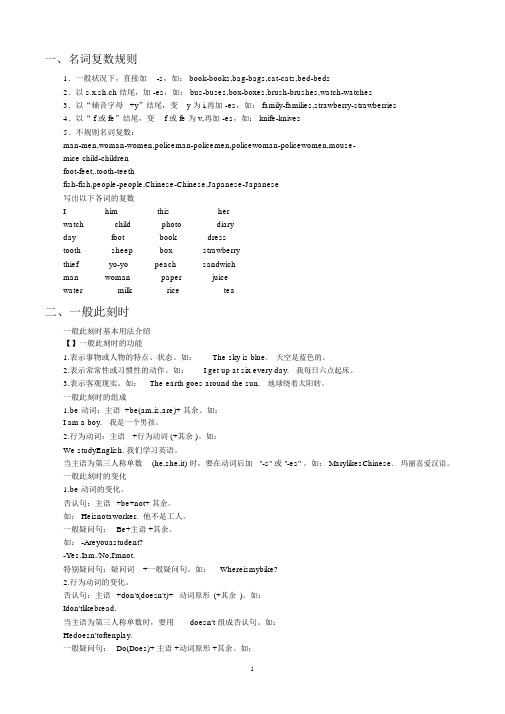
一、名词复数规则1.一般状况下,直接加-s,如: book-books,bag-bags,cat-cats,bed-beds2.以 s.x.sh.ch 结尾,加 -es,如: bus-buses,box-boxes,brush-brushes,watch-watches3.以“辅音字母+y”结尾,变y 为 i,再加 -es,如: family-families,strawberry-strawberries4.以“ f 或 fe”结尾,变 f 或 fe 为 v,再加 -es,如: knife-knives5.不规则名词复数:man-men,woman-women,policeman-policemen,policewoman-policewomen,mouse-mice child-childrenfoot-feet,.tooth-teethfish-fish,people-people,Chinese-Chinese,Japanese-Japanese写出以下各词的复数I_________him_________this___________her______watch_______child_______photo________diary______day________foot________book_______dress________tooth_______sheep______box_______strawberry_____thief_______yo-yo______peach______sandwich______man______woman_______paper_______juice___________water________milk________rice__________tea__________二、一般此刻时一般此刻时基本用法介绍【】一般此刻时的功能1.表示事物或人物的特点、状态。
- 1、下载文档前请自行甄别文档内容的完整性,平台不提供额外的编辑、内容补充、找答案等附加服务。
- 2、"仅部分预览"的文档,不可在线预览部分如存在完整性等问题,可反馈申请退款(可完整预览的文档不适用该条件!)。
- 3、如文档侵犯您的权益,请联系客服反馈,我们会尽快为您处理(人工客服工作时间:9:00-18:30)。
第一讲一般现在时
一、一般现在时的功能:
1、表示事物或人物的特征、状态。
如:The sky is blue.天空是蓝色的。
2、表示经常性或习惯性的动作。
如:I get up at six every day.我每天六点起床。
3、表示客观现实。
如:The earth goes around the sun.地球绕着太阳转。
二、一般现在时的基本构成:
1、含be动词的:主语+be(am,is,are)+其它。
如:I am a boy.我是一个男孩。
2、只含行为动词的:主语+行为动词(+其它)。
如:We study English.我们学习英语。
当主语为第三人称单数(he, she,it)时,要在动词后加"-s"或"-es"。
如:Mary likes Chinese. (玛丽喜欢汉语。
)
三、一般现在时的变化:
1、含有be动词的句子
1)否定句:在be动词后加not 如:He is not a teacher.(他不是教师。
)
2)一般疑问句:把be动词调到句首。
如:Is she a teacher?
3)特殊疑问句:疑问词+一般疑问句。
如:Where is my bike?
2、不含be动词,只含行为动词的句子
1)否定句:don’t(或doesn’t) +动词原形。
如:I don’t like banana. He doesn’t like apple. 2) 一般疑问句:Do( Does ) +主语+动词原形(+其它)。
如:- Do you often play football? sh.
Does your mother teach English?
3)特殊疑问句:疑问词+一般疑问句。
如:How does your father go to work?
★动词单三形式的变化规则:(当主语为第三人称单数时)
1.一般情况下,直接加-s,如:like-likes ,work-works
2.以s. x. sh. ch. o结尾,加-es,如:watch-watches,wash-washes,go-goes
3.以“辅音字母+y”结尾,变y为i, 再加-es,如:study-studies
★一般现在时的标志:(表示经常性的时间状语)
usually(通常),sometimes(有时),often(经常)等
第二讲现在进行时
一、现在进行时的功能:
表示现在正在进行或发生的动作。
所谓“正在进行中”,是指在谈到这件事的时候,这个动作还在进行中,至于什么时候开始的,什么时候会停下来,都无关紧要。
二、现在进行时的基本构成:
主语+be+动词ing.
三、现在进行时的变化:
1)否定句:在be后加not。
如:He is not reading a book.
2) 一般疑问句:把be动词调到句首。
3)特殊疑问句:疑问词+ be + 主语+ 动词ing?如:What is she eating?
当疑问词作主语时其结构为:疑问词+ be + 动词ing? 如:Who is singing?
★动词加ing的变化规则:(动词加ing称为动词现在分词)
1、一般情况下,直接加ing。
如:cook-cooking
2、以不发音的e结尾的,去e加ing。
如:make-making,take-taking,write-writing
3、如果末尾是一个元音字母加一个辅音字母的重读闭音节,要双写末尾的辅音字母,再加ing,如:run-running, swim-swimming,stop-stopping
★现在进行时的标志:
Look!(看)now(现在)
第三讲一般过去时
一、一般过去时的功能:
一般过去时表示过去某个时间发生的动作或存在的状态,常常与表示过去的时间状语连用。
一般过去时也表示过去经常或反复发生的动作。
二、一般过去时的基本构成:
1、含be动词的:主语+be动词的过去式(was或were)+其它
2、只含行为动词的:主语+动词的过去式+(其它)
三、一般过去时的变化:
1、含be动词的句子:
1)否定句:在be动词的过去式(was或were)后加not。
如:Yesterday was not sunny.
2) 一般疑问句:把be动词调到句首。
(was或were)。
Was Amy happy last weekend?
2、只含行为动词的:
1)否定句:主语+ didn’t + 动词原形。
如:He didn’t play football.
2)一般疑问句:Did + 主语+ 动词原形+(其它)。
如:Did you go swimming?
3)特殊疑问句:疑问词+did+主语+动词原形?如:What did John do yesterday?
当疑问词作主语时:疑问词+动词过去式?如:Who went fishing yesterday?
★动词过去式的变化规则:
1、一般情况下,直接加-ed,如:play-played, watch-watched
2、以e结尾的,不用加e,只加d,如:taste-taste(品尝)
3、如果末尾是一个元音字母和一个辅音字母的重读闭音节,应双写末尾的辅音字母,再加-ed,如:stop-stopped
4、以“辅音字母+y”结尾的,变y为i,再加-ed,如:study-studied
5、不规则动词过去式:(此类无规则可循,要专门记忆)
am,is--was, are--were, do--did, go--went,sing--sang,read-read,
have-had, eat-ate,take-took,see-saw,fly-flew,swim-swam, get-got(到达),
buy-bought, leave-left(离开)
★一般现在时的标志:(表示过去的时间状语)
yesterday(昨天),last weekend (上个周末),last year(去年)last Monday(上星期一)
last ...(上个...)
第四讲一般将来时
一、一般将来时的功能:
表示将来某一刻的动作或状态,或将来的打算、计划或准备做某事。
常常和表示将来的时间状语连用。
二、一般将来时的基本构成:
①be going to + do;如:I am going to watch TV.
②will+ do. 如:I will go home.
三、一般将来时的变化:
1、否定句:在be动词(am,is,are)或情态动词will后面加not。
[ will+not=won’t ]
2、一般疑问句:be或will提到句首。
3、特殊疑问句:疑问词+be动词+主语+ going+(to do)?
疑问词+will+主语+ do?
如:What are you going to do?
When are you going?
Where are you going?
★注意:be动词和will后+动词原形
★一般将来时的标志:(表示将来的时间状语)
tomorrow(明天),next week(下个星期),next...(下个...),soon(很快),
the day after tomorrow(后天)
★同义句:be going to = will
如:I am going to go swimming tomorrow. = I will go swimming tomorrow.。
